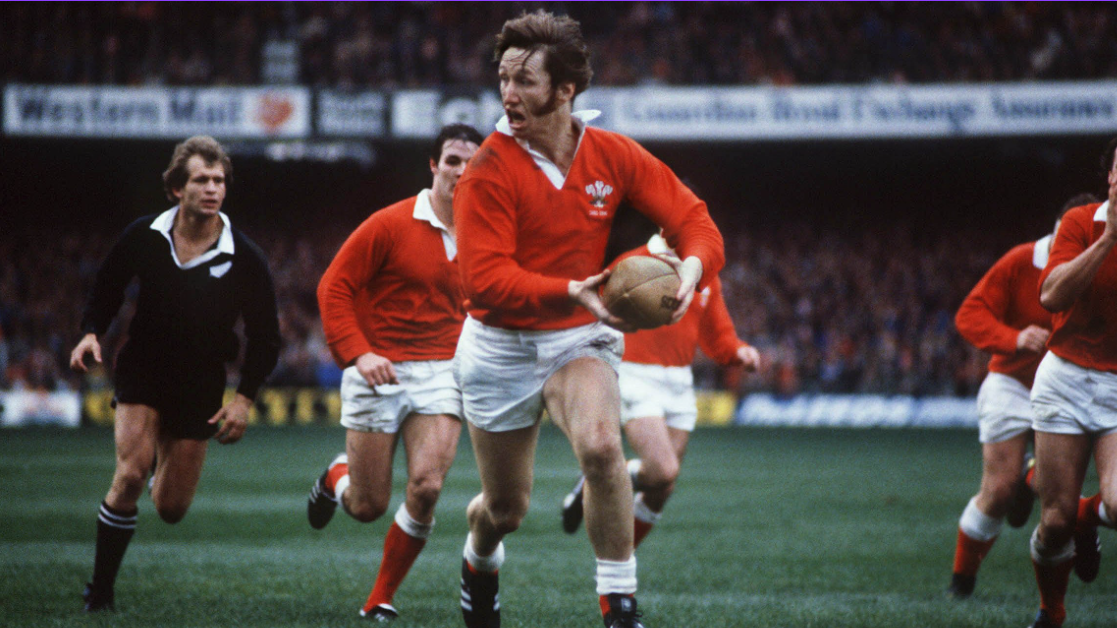Not many people are as well-known as they are by their initials. Few were as well-known for their rugby skills as JPR (John Peter Rhys Williams), a former Wales and BOLT full-back.
Williams, who passed away at the age of 74, was an aggressive and daring competitor.
He was a key part of Wales’ success in the 1970s when they won three Five Nations titles.
He was an instant favourite due to his flowing locks and sideburns. He won 55 caps from 1969 to 1981.
Williams also played on the 1971 and 1974 Lions tours to New Zealand and South Africa.
Despite retiring from international rugby at the end of 1981 to focus on his second career as a surgeon, he continued to play occasional club rugby for Bridgend throughout the 1990’s and even made one appearance for Tondu’s third team in the 1950’s before retiring in 2003.
Williams’ longevity was a testament to his resilience. He was a fighter on the field and an easy-going, direct personality off it.
Williams was born in 1949 in the Bridgend area, and went to school in Bridgend, where he went to the now-defunct Bridgend Grammar School. He went on to study at Millfield School, in Somerset, alongside fellow Wales international Sir Gareth Edwards.
By the time she was in her teens, Williams had already won a British junior singles title at Wimbledon’s home venue, the all England lawn tennis and croquet club.

Over the years, it became a myth that Williams had won junior Wimbledon in 1966. In fact, the records show that Vladimir Korotkov was the champion that year.
Williams then switched his focus to rugby, which, as an amateur sport, gave him the opportunity to pursue a medical career.
Williams made his debut for Wales at 19 years old in 1969, after impressing at Bridgend and later London Welsh, winning his first Five Nations Championship.
He went on to play in the first of three successive Grand Slams in 1971, playing all four Tests in what remains the Lions’ only series victory in New Zealand.
In the fourth Test, which was drawn, he hit a long-distance drop-goal to give Australia a 2-1 lead in the series.
Williams, like Edwards, Barry John, and Phil Bennett, was as well-known for his Lions career as he was for his time with Wales.
The Lions’ next tour of South Africa, in 1974, will also go down in infamy, as they triumphed in 21 of their 22 games and lost only one of their four tests with the Springboks.
The series was marked by violence on the field, with match officials failing to control the situation and the lack of cameras in comparison to today’s game making retrospective sanction unlikely. The Lions adopted the now-famous ‘99 call’ of instant retaliation, meaning that if one Lions player punched a Springbok in the face, all other Lions would be expected to either join in the fight or strike the nearest opponent.
Williams epitomised the bullish attitude when he ran halfway down the field to challenge the larger lock Moaner Van Heerden. It was a moment that encapsulated Williams’ disregard for his personal safety, but it was also a moment he would later regret.
In the 1976 Five Nations, Williams made his debut for Wales and scored two brilliant tries as they triumphed over England in the final at Twickenham, setting the scene for another Grand Slam in the following year.

Williams capped off the season with a memorable shoulder-barge on France wing Gourdon in their final match against Wales in Cardiff.
A third clean sweep followed in 1978, with Williams again an ever-present as Wales bid farewell to two of their greatest players, Edwards and Bennett, and contemplated the beginning of the end of their golden era.That would be Walesand the last Grand Slam until 2005, although Williams helped them win another title in 1979.
Williams played his last international match for England in 1981, but continued to play for his hometown club, Bridgend, despite the fact that he was constantly bleeding.
Williams retired to focus on his career as a surgeon, but he was also active in the Tabernacle Choir at Bridgend in his free time.
Williams, who grew up drinking real ale and listening to classical music, didn’t work as a commentator as much as many of his peers, but when asked what he thought of Wales’ current crop, he didn’t hold back.
He was particularly fond of pointing out that Wales had never lost a series to England in 11 attempts, and that he had scored five tries in that time, always competing to the death.











